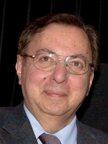Tim Lougheed

An annual lecture series now honours Howard Alper, former vice-president, research from 1997 to 2006, who guided the University into the ranks of Canada’s leading research institutions.
Called New Horizons, the series kicked off on October 14 with a presentation by Theodor Hänsch, winner of the 2005 Nobel Prize in physics. His lecture dealt with the role of precise, laser-based spectroscopic techniques in the development of atomic physics.
The subject reflects the achievements that earned Hänsch the Nobel, in particular his role in establishing a technique to calibrate wavelengths of light with unprecedented precision. This work laid the foundation for a number of significant applications, including improvements in the use of satellites for navigation and the global synchronization of computer-data networks.
The lecture emphasized the value of interdisciplinary inquiry and innovative thinking, setting a tone for ongoing New Horizons speakers, who are expected to highlight collaboration and building bridges between various fields of study. The date and theme of the next lecture have not yet been set, but organizers are committed to continuing the series.
“The New Horizons lectures were established to showcase outstanding accomplishments in interdisciplinary research,” says Dr. Alper. “The lecture series provides opportunities for the University of Ottawa to bring exceptional researchers to campus, to meet with faculty and students, as well as to give presentations. The New Horizons lecturer will also learn about our University's leadership in encouraging and supporting interdisciplinary initiatives.”
Those same priorities have been among the hallmarks of Dr. Alper’s contributions during his more than 30 years at the University.
“If a university is to be among the best in Canada, and compete effectively on a global stage, the institution must set research priorities and carve out effective niches in which to work,” he stated by way of introducing four strategic areas of development intended to meet this objective. This approach also featured pre- and post-doctoral fellowships, the clustering of Canada Research Chairs, and the creation of new research centres on campus.
Dr. Alper’s own research career testifies to the importance of a multidisciplinary perspective. He has pursued aspects of organic and inorganic chemistry that have yielded insights of interest to the pharmaceutical, petrochemical, and commodity chemical industries.
Now a Distinguished Professor at the University, he is also a visiting executive at the International Development Research Centre. There he builds linkages between researchers from developed and developing countries, representing the Royal Society of Canada as part of international efforts to enhance economic development for Africa through science and innovation.